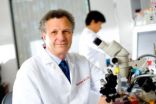(Press-News.org) Boston, MA — Men's sperm quality may be significantly affected by their levels of physical activity, according to a new study led by researchers at Harvard School of Public Health (HSPH). They found that healthy young men who were sedentary, as measured by hours of TV viewing, had lower sperm counts than those who were the most physically active.
"We know very little about how lifestyle may impact semen quality and male fertility in general so identifying two potentially modifiable factors that appear to have such a big impact on sperm counts is truly exciting," said lead author Audrey Gaskins, a doctoral student at HSPH.
The study will be published online February 4, 2013 in the British Journal of Sports Medicine.
Gaskins and her colleagues analyzed the semen quality of 189 men between the ages of 18 to 22 participating in the Rochester Young Men's Study during 2009 at the University of Rochester. The men were asked about their physical activity and TV-watching habits, in addition to health issues that may affect their sperm quality, such as diet, stress levels, and smoking.
Results showed that men who watched more than 20 hours of TV weekly had a 44% lower sperm count than those who watched almost no TV. Men who exercised for 15 or more hours weekly at a moderate to vigorous rate had a 73% higher sperm count than those who exercised less than 5 hours per week. Mild exercise did not affect sperm quality.
"The majority of the previous studies on physical activity and semen quality had focused on professional marathon runners and cyclists, who reach physical activity levels that most people in the world cannot match. We were able to examine a range of physical activity that is more relevant to men in the general population," said Jorge Chavarro, senior author of the study and assistant professor of nutrition and epidemiology at HSPH.
###
The authors caution that, while a reduced sperm count has been linked to lower fertility, it does not necessarily preclude men from fathering a child.
Support for the study was provided by National Institutes of Health grants T32DK007703-16 and P30DK46200 and European Union DEER Grant 212844.
TV viewing, exercise habits may significantly affect sperm count
20 hours of TV weekly may nearly halve sperm count; 15 or more hours of moderate to vigorous exercise weekly may boost sperm count
2013-02-05
ELSE PRESS RELEASES FROM THIS DATE:
A 'nudge' can be the ethical choice
2013-02-05
HOUSTON -- (Feb. 6, 2013) – As patients and physicians share decision-making in choices among treatment options, decision aids such as videos, websites, pamphlets or books are coming to play an important role. However, in some cases, it may be ethical for the decision aids to provide a "nudge" toward a particular option, said researchers from Baylor College of Medicine, the Michael E. DeBakey Veterans Affairs Medical Center and the University of Texas MD Anderson Cancer Center in a report that appears in the journal Health Affairs.
In general, decision aids are meant ...
Study highlights important role that patients play in determining outcomes
2013-02-05
EUGENE, Ore. — When it comes to health care, patients with the motivation, knowledge, skills and confidence to manage their own health have better health outcomes and incur fewer health care costs.
Those are the findings of a study led by Judith Hibbard, a professor emerita in the Department of Planning, Public Policy and Management at the University of Oregon. Hibbard and co-authors found that patients with the lowest level of "activation"— that is, those most lacking in the skills and confidence to be actively engaged in their health care — had average costs that were ...
Damaged blood vessels loaded with amyloid worsen cognitive impairment in Alzheimer's disease
2013-02-05
NEW YORK (February 4, 2013) -- A team of researchers at Weill Cornell Medical College has discovered that amyloid peptides are harmful to the blood vessels that supply the brain with blood in Alzheimer's disease -- thus accelerating cognitive decline by limiting oxygen-rich blood and nutrients. In their animal studies, the investigators reveal how amyloid-β accumulates in blood vessels and how such accumulation and damage might be ultimately prevented.
Their study, published in the Feb. 4 online edition of the Proceedings of the National Academy of Sciences (PNAS), ...
Researchers develop Rx for deafness, impaired balance in mouse model of Usher syndrome
2013-02-05
New Orleans, LA – Jennifer Lentz, PhD, Assistant Professor of Otorhinolaryngology & Biocommunications and a member of the Neuroscience Center of Excellence at LSU Health Sciences Center New Orleans, is the lead author of a paper reporting that hearing and balance can be rescued by a new therapy in a mouse model of Usher syndrome (Usher) that contains the mutation responsible for type 1C Usher. The results provide the first evidence that congenital deafness can be effectively overcome by treatment early in development to correct gene expression. The paper, Rescue of hearing ...
Monogamous birds read partner's food desires
2013-02-05
New research shows that male Eurasian Jays in committed relationships are able to share food with their female partner according to her current desire.
The behaviour suggests the potential for 'state-attribution' in these birds – the ability to recognise and understand the internal life and psychological states of others.
The research was carried out in Professor Nicola Clayton's Comparative Cognition lab at Cambridge University's Department of Psychology, and is published today in the journal PNAS.
Researchers tested mated jays and separated males from females. ...
Birds may need a hand to weather climate change
2013-02-05
A new study led by Durham University and BirdLife International, shows that many bird species are likely to suffer under future climate change, and will require enhanced protection of important sites, better management of the wider countryside, and in some of the most extreme cases may need to be physically moved to climatically suitable areas to help them survive.
The priority, the researchers say, is for stronger protection and effective management of networks of important sites for conservation which currently support priority species and could offer new habitat for ...
Research suggests meerkat predator-scanning behaviour is altruistic
2013-02-05
VIDEO:
In order to spot potential predators, adult meerkats often climb to a higher vantage point or stand on their hind legs. If a predator is detected, they use several different...
Click here for more information.
In order to spot potential predators, adult meerkats often climb to a higher vantage point or stand on their hind legs. If a predator is detected, they use several different alarm calls to warn the rest of the group. New Cambridge research shows that they are ...
Vitamin C supplements linked to kidney stones
2013-02-05
New research from Karolinska Institutet in Sweden shows that men who take vitamin C supplements regularly run a higher risk of developing kidney stones. The study, which is published in the scientific periodical JAMA Internal Medicine, did not however observe an increased risk between kidney stones and multivitamins – which contain lower concentrations of vitamin C.
The research is based on data from a large population-based study of men from Västmanland and Örebro counties, who were monitored for 11 years. A total of 23,355 men were identified who had no history of ...
Injection-free vaccination technique could address global vaccine challenge for HIV, malaria
2013-02-05
Scientists at King's College London have demonstrated the ability to deliver a dried live vaccine to the skin without a traditional needle, and shown for the first time that this technique is powerful enough to enable specialised immune cells in the skin to kick-start the immunising properties of the vaccine.
Funded by the Bill & Melinda Gates Foundation and published today in Proceedings of the National Academy of Sciences, researchers say although it is an early study this important technical advance offers a potential solution to the challenges of delivering live ...
Chemical reaction keeps stroke-damaged brain from repairing itself
2013-02-05
LA JOLLA, Calif., February 4, 2013 – Nitric oxide, a gaseous molecule produced in the brain, can damage neurons. When the brain produces too much nitric oxide, it contributes to the severity and progression of stroke and neurodegenerative diseases such as Alzheimer's. Researchers at Sanford-Burnham Medical Research Institute recently discovered that nitric oxide not only damages neurons, it also shuts down the brain's repair mechanisms. Their study was published by the Proceedings of the National Academy of Sciences the week of February 4.
"In this study, we've uncovered ...
LAST 30 PRESS RELEASES:
COVID-19 vaccination during pregnancy may help prevent preeclampsia
Menopausal hormone therapy not linked to increased risk of death
Chronic shortage of family doctors in England, reveals BMJ analysis
Booster jabs reduce the risks of COVID-19 deaths, study finds
Screening increases survival rate for stage IV breast cancer by 60%
ACC announces inaugural fellow for the Thad and Gerry Waites Rural Cardiovascular Research Fellowship
University of Oklahoma researchers develop durable hybrid materials for faster radiation detection
Medicaid disenrollment spikes at age 19, study finds
Turning agricultural waste into advanced materials: Review highlights how torrefaction could power a sustainable carbon future
New study warns emerging pollutants in livestock and aquaculture waste may threaten ecosystems and public health
Integrated rice–aquatic farming systems may hold the key to smarter nitrogen use and lower agricultural emissions
Hope for global banana farming in genetic discovery
Mirror image pheromones help beetles swipe right
Prenatal lead exposure related to worse cognitive function in adults
Research alert: Understanding substance use across the full spectrum of sexual identity
Pekingese, Shih Tzu and Staffordshire Bull Terrier among twelve dog breeds at risk of serious breathing condition
Selected dog breeds with most breathing trouble identified in new study
Interplay of class and gender may influence social judgments differently between cultures
Pollen counts can be predicted by machine learning models using meteorological data with more than 80% accuracy even a week ahead, for both grass and birch tree pollen, which could be key in effective
Rewriting our understanding of early hominin dispersal to Eurasia
Rising simultaneous wildfire risk compromises international firefighting efforts
Honey bee "dance floors" can be accurately located with a new method, mapping where in the hive forager bees perform waggle dances to signal the location of pollen and nectar for their nestmates
Exercise and nutritional drinks can reduce the need for care in dementia
Michelson Medical Research Foundation awards $750,000 to rising immunology leaders
SfN announces Early Career Policy Ambassadors Class of 2026
Spiritual practices strongly associated with reduced risk for hazardous alcohol and drug use
Novel vaccine protects against C. diff disease and recurrence
An “electrical” circadian clock balances growth between shoots and roots
Largest study of rare skin cancer in Mexican patients shows its more complex than previously thought
Colonists dredged away Sydney’s natural oyster reefs. Now science knows how best to restore them.
[Press-News.org] TV viewing, exercise habits may significantly affect sperm count20 hours of TV weekly may nearly halve sperm count; 15 or more hours of moderate to vigorous exercise weekly may boost sperm count


